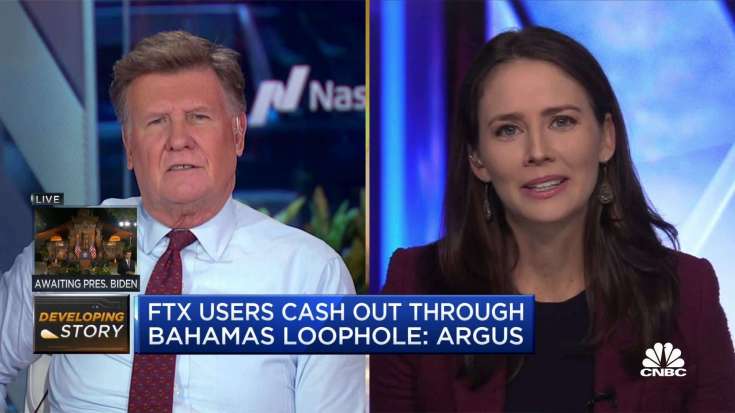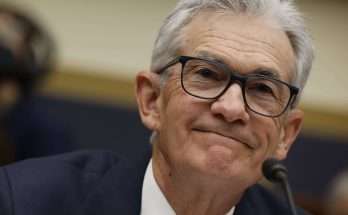Changpeng Zhao, billionaire and chief executive officer of Binance Holdings Ltd., speaks during a session at the Web Summit in Lisbon, Portugal, on Wednesday, Nov. 2, 2022.
Zed Jameson | Bloomberg | Getty Images
Binance CEO Changpeng Zhao said the cryptocurrency exchange has seen only a slight uptick in withdrawals and is operating normally despite a fall in digital asset prices after the collapse of FTX.
Speaking on a live “ask me anything” session on Twitter Monday, Zhao said there had been “no news about significant withdrawals” from a number of “cold” cryptocurrency wallets the firm published details of in the wake of FTX’s bankruptcy.
related investing news
Binance has seen a “slight increase in withdrawals,” said Zhao, but he added this was in line with typical activity during times of declines in the crypto market. “Whenever prices drop, we see an uptick in withdrawals,” Zhao said. “That’s quite normal.”
After months bouncing stubbornly around the $20,000 level, volatility returned to bitcoin last week as news of a liquidity crisis at FTX roiled the market. Bitcoin was trading at a price of $16,600 Monday afternoon in London, barely moving from the 24 hours prior.
“We have not seen like 80% withdrawn from our cold wallets, or 50% of funds flowing from our platform, whereas it maybe happened with some other platforms,” Zhao said. “For us, it’s still business as usual.”

FTX entered bankruptcy on Friday after facing a liquidity crunch as investors fled over concerns about its financial health. Binance had originally offered to buy the company but pulled out of the deal after a short period of due diligence.
Crypto contagion
FTX’s troubles began after a CoinDesk report detailed ties between the exchange and its sister company Alameda Research.
A subsequent tweet from Zhao saying he would sell Binance’s $580 million stash of the exchange’s native FTT token “due to recent revelations” triggered a selloff in FTT and billions of dollars in withdrawals from FTX.
On Monday, Zhao said he did not mean to trigger “turmoil” in crypto markets, adding that while some people have blamed him for “whistleblowing or poking the bubble” he wasn’t aware his tweet would cause such damage.
Speaking about the possibility of more players facing a crisis after FTX’s collapse, Zhao said “there will be some cascading contagion effects.” The scale of failures of crypto companies — and resulting drops in the prices of digital currencies — will lessen over time, he added.
“In this type of situation, the first one to go down is the usually the big one,” said Zhao. “The cascading effects become smaller and smaller.”
Crypto’s crisis this year largely stemmed from an intermingling of businesses owing money to others and having their reserves tied up in illiquid tokens.
In May, the $60 billion stablecoin project Terra saw its two main tokens become worthless after the sustainability of their technical model was questioned. That in turn prompted a wave of failures in crypto, with Celsius, Three Arrows Capital and Voyager Digital all filing for bankruptcy protection.
“A couple of years later all of this will blow away,” Zhao said, commenting on FTX’s collapse and the ensuing crypto selloff. “People may not even remember this.”
Earlier Monday morning, Zhao said Binance would set up an “industry recovery fund” to help distressed firms and “reduce further cascading negative effects.” Details of the fund are scant, however the Binance boss said more would be revealed soon.
Binance has its own venture fund which makes investments in crypto projects, called Binance Labs. So far, Zhao hasn’t heard any “big cries for help” from his portfolio companies which, he said, are “much less impacted” than other firms in the industry.

Zhao’s remarks echoed comments from Crypto.com CEO Kris Marszalek earlier Monday who, in response to concerns of an FTX-style liquidity crisis, said his firm had a “tremendously strong balance sheet” and wasn’t having any trouble handling a jump in withdrawals.
“We never engage as a company in any irresponsible lending practices, we never took any third-party risks,” he said.
Alameda Research, FTX’s sister company, borrowed billions in customer funds from the exchange to ensure it had enough funds on hand to process withdrawals, CNBC reported Sunday.
Bankman-Fried declined to comment on allegations of misappropriating customer funds but said its recent bankruptcy filing was the result of issues with a leveraged trading position.


